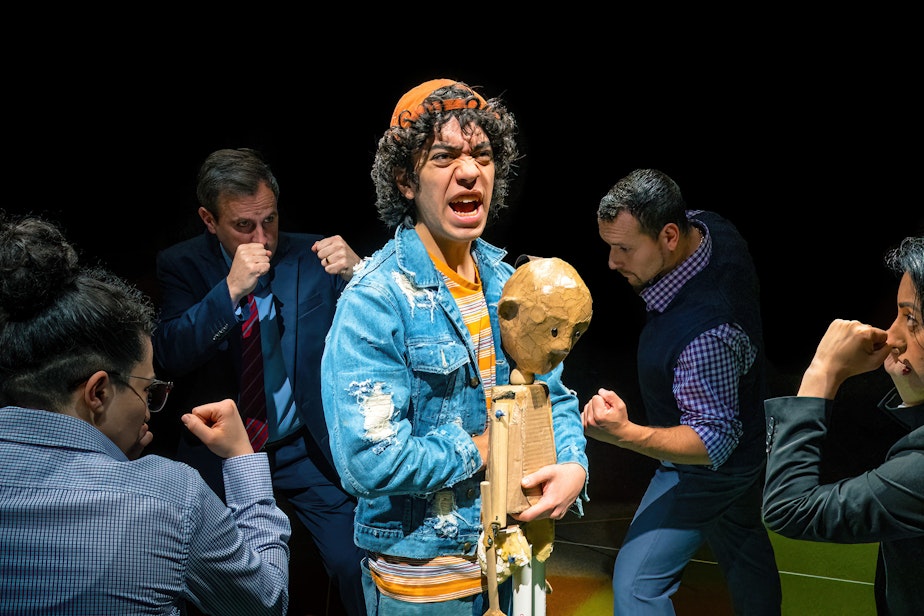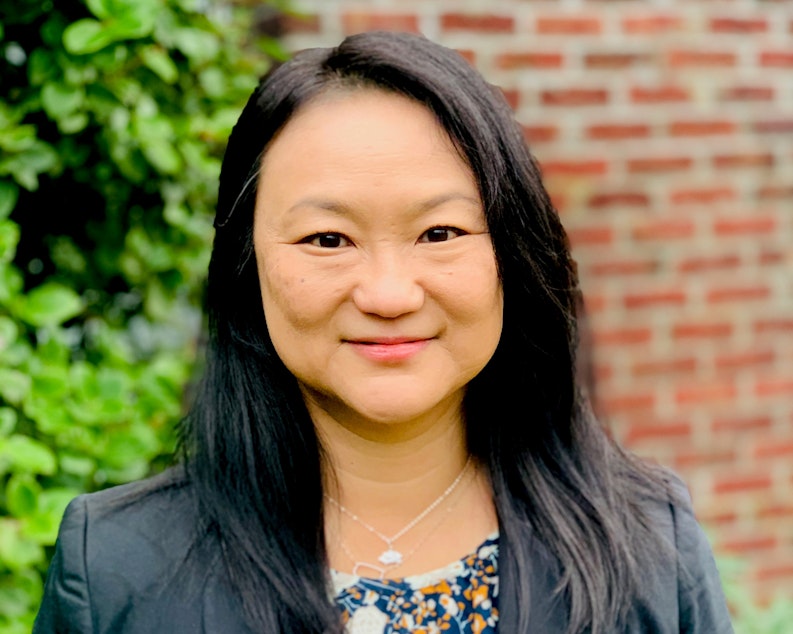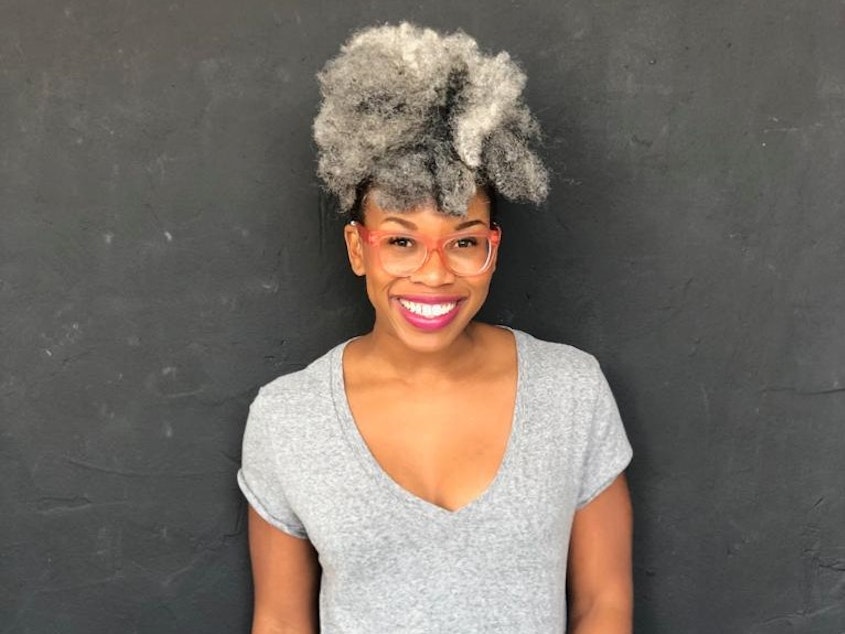'Wolf Play' explores an adoption narrative many experience in real life

In ACT Theatre's "Wolf Play," the audience watches as a Korean child is adopted, and then re-homed to another family. We watch as he experiences pain and confusion, and then grapples with the realities of adoption.
That's not an experience that's unique to the theater.
"Wolf Play" begins with an actor on stage, controlling a puppet of a small boy.
"One of the things that the play begins with is it asks the audience to take a leap of imagination," explained director Rosa Joshi. "It's about an adopted Korean boy, who says he's a wolf. The original family who adopted him, can't handle him and puts him up for re-adoption."
Throughout the production, the actor controlling the puppet seamlessly transitions between young boy and wild animal.
The scene where the boy is transferred from his old father to his new family is chaotic. We see the puppet desperately clinging to the father he has grown up with. We hear narration from the perspective of the wolf who is being ripped away from his pack. He is confused, angry, and unable to fully comprehend why this is happening.
In a production that accomplishes the mighty task of tackling these complex issues with a light tone, this is one of a few key moments that left the audience stunned.
Sponsored
"Having the child played by a puppet makes us see how much the child is manipulated, or the child, you know, doesn't have any agency," Joshi said. "But then also seeing the actor tell us the inner life of the child lets us into that child's emotional world, as these things are happening to the child."
The child communicates his inner world to the audience through the persona of the wolf.
The audience can hear the wolf speaking, but the characters on stage cannot. This gives the audience an exclusive view into the inner world of the boy as he is transferred to his new family, a queer couple figuring out what it means to have a child, and his adjustment.
There is an intimacy created between the audience and the boy. It forces those in attendance to root for him, and feel relief when he triumphs over the adversity he faces adjusting to his new life after being rejected by his original adopted family.
The themes presented in "Wolf Play" — rehoming of adopted children, transracial adoption, international adoption — are issues that also impact real people, not just characters in a show.
Sponsored

The messy state of of adoption law
There are lots of different forms of adoption — foster care adoptions, private domestic adoption, international adoptions. And all of them are ruled and governed by different policies.
JaeRan Kim said that makes it hard to keep track of children after they’ve been adopted into a family.
"We don't even really know how many adoptions happen every year and how many of them may not work out," Kim explained. "And part of the reason is because we have a really fractured system."
Sponsored
Kim, an associate professor in the School of Social Work and Criminal Justice at the University of Washington, Tacoma, researches the wellbeing of adoptees, particularly from transracial and transnational adoptions.
If, like the child in "Wolf Play," a family or child needs help, it’s up to the family to reach out to whatever agency they worked with. There aren’t always people doing follow-up to see how things are going.
"It really has to do with the cultural values in the United States, around the privacy of families," Kim said. "Once an adoption is finalized, families want to just continue to exist without the interference of agencies kind of poking their nose into what's going on on a day to day basis."
That, Kim said, is one of the factors that leaves children vulnerable to the kind of “rehoming” that occurs in "Wolf Play."
For Kim, transnational adoption is more than a research topic; it’s also personal.
Sponsored
"I'm adopted from South Korea myself, and I had a very stable childhood growing up with my adoptive parents. But as I met more adoptees throughout my life, this is what I learned, that some adoptees had been abandoned by their adoptive parents and ended up in the foster care system in the United States or some adoptees were deported or some adoptees were abused or neglected, or some had false paperwork."
Kim said that, as many adoptees get older, they realize that the system is complicated, and messy. It’s not always the sunshine and rainbows narrative you see in media like the musical "Annie."
"At a certain point, sometimes adoptees uncover that their own records were falsified that there were things that happened either in their families of origin or with their adoption agencies that don't look right," Kim said. "We know that there are lots of cases where adoptees are adopted under questionable circumstances, especially when there's not a lot of laws to really protect or govern what's happening with those families. I think that especially internationally, families are very vulnerable. And children are very vulnerable."
These are some of the challenges that come with international adoptions, as illustrated in "Wolf Play." But there's another wrinkle the play explores, one that happens even when adopted children don't come from outside countries.

Sponsored
Transracial adoption and cultural erasure
Angela Tucker is the author of "'You Should be Grateful': Stories of Race Identity, and Transracial Adoption." She’s also the founder of the Adoptee Mentoring Society, and has more than 15 years of experience working within adoption and foster care agencies.
She grew up with seven siblings, some Black, some Asian, some white, like her parents. But she said that she and her siblings were pretty much the only Black kids in her school, and that in the predominantly white city of Bellingham, she felt tokenized.
She said, even as a kid, she understood she was different from her parents.
"I think myself and a lot of transracial adoptees are really good at fitting in, we might have lots of friends and participate in the extracurriculars and all of that," Tucker said. "So from the outside, you really don't see a problem. But when I think about the health for transracial adoptees, my goal is a sense of belonging."
Tucker said she believes every adoption is traumatic for the child, even when it's as a newborn baby. Even having been in a wonderful foster home, and later a loving adoptive home, doesn't erase the longing for her birth mother.
"It's why I called my book, 'You Should be Grateful,' because people often talk about situations like mine, where I was placed into a good home and then another good home. And from the outside perspective look like I was given everything," Tucker said. "They are assuming that my birth family — whom I didn't know, growing up, and they obviously don't know — would have been worse for me."
Tucker said growing up, she knew very few Black kids or adults, and that often transracial adoptees feel like racial imposters.
"There is a sense of like performative Blackness that happens when you're the only and are flung stereotypes at you all the time," she explained. "For transracial adoptees who don't grow up in their culture, the first time they are really immersed in a place that has people who look like them, you feel like you don't completely belong there, either."
Tucker said that, when she did meet her birth family as an adult, that cultural erasure made things difficult.
Even so, Tucker said connecting with her birth family has given her a sense of calm and sturdiness that she didn't have growing up.
"Being able to form a relationship, actually just having their numbers on my cell phone feels like I'm no longer like walking on sand," she explained. "I feel like I have roots and I can bloom and flourish in a different way. It's remarkable. It's something I wish that I could have had my whole life."
Tucker said it is possible for white parents who adopt children of color to balance their cultural differences, without erasing the adoptee's cultural heritage. And that, in part, it needs to involve outsourcing.
"I think it's no different than, you know, if you're a parent and you don't play piano, but you want your kid to learn piano," Tucker said. "You'll take them to someone else who can teach them piano. It's no different. It's just so much more charged because it's about race."
Tucker also notes that the public needs to see more stories from the point of view of adoptees, and stories from a perspective that is even more rare, that of the birth parents.
"It's really easy to continue to make a sweeping generalization that if you were adopted, your birth parents must be bad," Tucker said. "So I'm excited for more adoptees to speak out, but we're going to need birth parents', first parents', stories out there too. So people can stop assuming basically that wealth equals better. And that poverty equals your parents don't love you."





